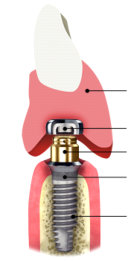Why Consider Overdentures?
 Too many people who have conventional dentures don’t wear them for the simple fact that they don’t stay in place. Dental implants offer a way to keep dentures in place and allow you to go about your daily life with confidence.
Too many people who have conventional dentures don’t wear them for the simple fact that they don’t stay in place. Dental implants offer a way to keep dentures in place and allow you to go about your daily life with confidence.
The use of dental implants to stabilize dentures has proven to be successful for many people. The number continues to grow as word spreads about the effectiveness and long-term durability of the treatment. In fact, it has been reported that dental implants have the highest success rate of any implanted surgical device.*
The Problems with Loose Dentures
Millions of people around the world are missing enough teeth to require the use of a denture. Many of them struggle to keep their dentures secure, particularly in the lower jaw. If you have this problem, you already know about the embarrassment of slipping dentures, not being able to eat the foods that you love and the ineffectiveness of denture adhesives. Fortunately, there is a way to make your denture work the way it was intended: stabilize it with dental implants.
Benefits of Denture Stabilization
- Restores proper chewing, allowing a better diet and improved health
- Improves speech and confidence
- Increases comfort with less irritation of gum tissue
- Ends the cost and inconvenience of denture adhesives
- Often can utilize your existing denture
- Minimally invasive procedure
About Connecticut Overdentures
Titanium posts (implants) are inserted into the jaw, where the bone will heal around them. After the implants have healed, your denture is modified to snap onto the implant abutment. The denture will be secure but may be removed for cleaning with a simple “snap”.

Implant surface promotes integration with the bone
Overdenture Options
Dental Implant Placement
If all your upper or lower teeth are missing, a custom-made denture may be secured using dental implants. The number of implants will vary for each patient.

Make Custom Overdenture
You will be fitted for a custom overdenture that attaches directly to the implants. The holes in the overdenture will be covered after attachment.

Overdenture Attached
Your new teeth are firmly supported by the implants to stimulate the jaw and maintain bone. Your dentist can remove the denture when needed for maintenance and cleaning.

What to Expect
Treatment Planning
Our dental professionals will take x-rays and create a model of your existing teeth to determine implant position. Occasionally, a bone or gum tissue graft will be needed to create an adequate site for the dental implants.
Implant Placement
Dental implants are placed into the bone in a relatively pain-free procedure. The bone and gums will be given time to heal before a denture is secured. Your current denture may be modified to fit over your new dental implants allowing the denture to function and the dental implants to heal.
Overdenture Attachment
Your final denture will be secured in one of two ways depending on your treatment. Your doctor will provide you a new overdenture that will “snap” onto your dental implants. If you have chosen a more advanced method, your new overdenture will be secured in place using screws that fit into the dental implants.